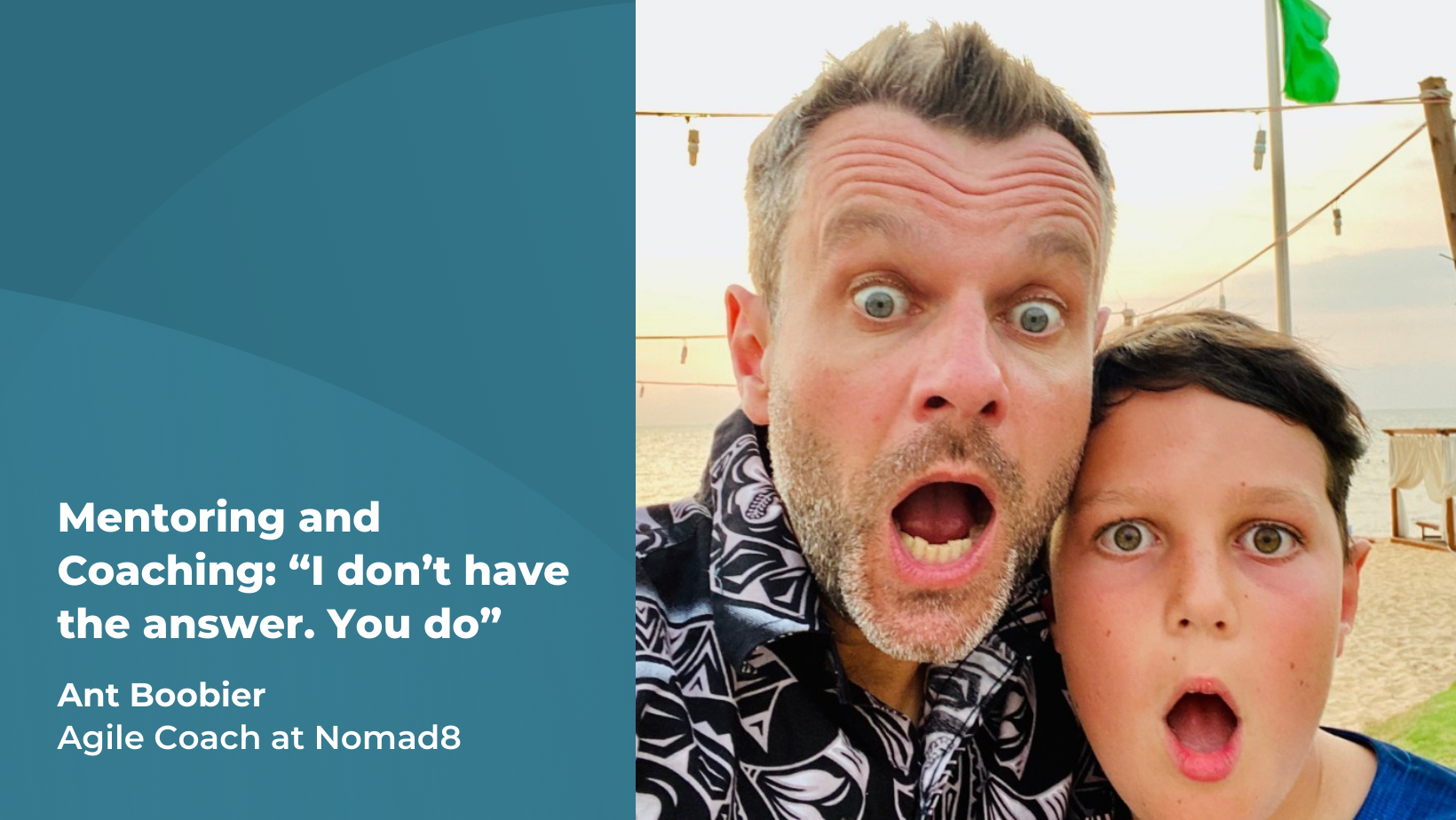Mentoring and Coaching: “I don’t have the answer. You do”
Introduction by Yekti Crow, the Industry Engagement Manager at Summer of Tech
At Summer of Tech, a big part of our charity focus is to give opportunities to students to learn job-ready skills and be exposed to the most in-demand technologies in Aotearoa. Industry volunteers play a crucial role in the sustainability of our programme as part of our ongoing support to candidates. We cannot do it without the help of our amazing industry volunteers. They contribute their time, knowledge and energy to empowering students in our programme.
Every year, hundreds of volunteers sign up to help with our programme. For some, it will be their first time supporting someone navigating their career search journey. We are collaborating with Ant Boobier, from Nomad 8, to share some guidelines on mentoring and coaching that will be hugely useful for volunteers in supporting the next generation of tech superstars. Ant has been a long-time industry mentor and champion of our programme and is keen to share his knowledge with fellow volunteers.
Congratulations, you’re a mentor!
Co-written by Ant Boobier and Yekti Crow
This is a great opportunity for a personal developmental relationship in which you, the mentor, use your knowledge and experience to help guide a mentee (yes, they are called the mentee!). It is a great growth opportunity for both, but it can be daunting. Where do you start? How do you approach it? What do you say?
Like anything, the more you practise, the better you will become. No mentoring session will be the same; the key is to relax and put structure around how you approach them. I use the GROW coaching model as a base framework:
Goal: what is the mentee looking to achieve?
Reality: what is the current situation, what has the mentee tried and what barriers are in their way?
Options: explore options and offer advice based on your experience as a mentor
Will: get the mentee to own an action that will help move them forward
The GROW model works for coaching and mentoring conversations; what is the difference between the two? In coaching, you guide and inspire people to discover answers within (by focussing on powerful open-ended questions). Whereas in mentoring, you guide by acting as an experienced and trusted advisor. In both roles, you aim to help the person improve.
Think of your mentoring conversation as an arc as you move through the 4 stages of the GROW model. The structure is important, don’t jump straight to options, advice and action.
You will start your conversation coaching and asking powerful questions and diverge as you enter mentoring as you offer advice and talk through options, then converge back to an action the mentee will take.
I map that arc onto the GROW model, giving a good structure and mental model for approaching your mentoring conversations.
To structure your session, keep the arc in mind as you have that conversation. Start with a focus on coaching and powerful questions to establish a goal, expand on that to understand the current reality, and then switch to mentoring as you give advice, stories and explore options. Finally, coach them to converge on an action and next steps.
Give enough time for each stage. Don’t spend too long on the goal. Suggest and give yourself time at the end to converge onto an action at the Will stage. The four stages break down like this:
Goal: What does your mentee want to discuss?
It’s important that you make your mentee feel comfortable and at ease so that you can have a meaningful conversation. Chances are you won’t have long to do that, and this could be a one-off session with the mentee. Given that, the best way to open the session is to smile and say hello using their name (if you're unsure how to pronounce their name, ask them; repeat it back and ask if you got that right). Then start with a question such as:
What would you like to talk about?
What would you like to achieve?
Show that you are interested and present by actively listening to them. When you ask questions and respond, use words that they have used, along with their name. Be authentic and use radical candour, candor needs ‘u’!; show that you care about the mentee’s development and growth while simultaneously challenging them directly.
If you find the conversation spinning at this stage, refocus by asking your mentee, ‘It sounds like [area you have heard your mentee talk about]. Shall we focus on that?’
Reality: What is happening right now?
As you move into the Reality stage, you will start to explore the goal. To do this, use powerful questions such as:
What is happening at the moment?
What have you tried? What else…?
What action have you taken so far?
What is getting in your way?
When you ask them questions, you listen to understand - not for a pause to jump and offer advice. Get comfortable with silence while they’re thinking; not everybody thinks out loud. You are exploring the topic to understand their options and give advice in the next stage.
Options: What could be done?
This is all about generating ideas and options for moving forward and where the conversation switches to mentoring. At this stage, you should offer direction, guidance and motivation through stories, examples, advice and experience. Be honest. If you don’t have relevant expertise or knowledge, tell them. This doesn’t mean you can’t explore options, but the focus should be more on coaching and powerful questions such as:
What options do you have?
What would you advise someone else in your situation to do?
What else?
You may have the answers, but you don’t have to answer everything. Explore options together and bounce ideas if you don’t have experience in an area.
Remember, it’s OK not to know! The more you know about a domain, the more you know you don’t know about that domain!
Beware the curse of knowledge, though, where we assume the person we are communicating with has the background knowledge we do to understand. Put yourself in the position of your mentee; remember what it was like not to know. Your growth as a mentor will be how you explain to and guide your mentee and help them grow their knowledge and confidence in a domain.
Get them to believe in themselves and have it within them to take that action. Remember to focus on radical candour.
Will: What will your mentee do?
Don’t choose or own your mentees’ actions; get them to take responsibility for themselves. As a Summer of Tech mentor, you may not check in with this person again. By supporting them to choose their path, you will be helping them grow. Let your mentee make their own decisions. Don’t care more than they do if they don’t take ownership of something they’re really not worried about.
Use a powerful question to move them to the next step, such as:
What will you do?
Finally, close your session by thanking them and wishing them all the best.
Conclusion
Don’t forget, the more you practise, the better you get! Don’t wait for a Summer of Tech mentoring session. Practise the GROW model and arc with your friends, colleagues and whānau, and ask them for feedback so you can learn and grow. Keep in mind the scope of your role as a mentor and the responsibility of your mentee.
Your role is -
Not to change their mind, but to open it up
Not to cover everything, but to focus on something
Not to push a solution, but to offer advice
Not to choose a path for them, but to show them the paths they could take
Not to hold them accountable to you, but to hold them accountable to themselves
So again, congratulations on being a mentor. Enjoy the experience as you and your mentee both grow together!




